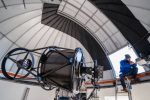| Astrophysicist Key Stats | |
|---|---|
| Avg. Salary / year | $134,430 |
| Avg. Pay / hour | $64.63 |
| Education | 4+ Years |
| Job Outlook | 9% |
Astrophysicists are experienced professionals who work in a focused branch of astronomy.
Astrophysics is the specialized branch that centers on the physics of the universe.
Astrophysicists can provide their skills in a variety of industries including research to assist with important projects or in academia to educate students in Astrophysics; some individuals may take positions at a university or college and perform both tasks.
Individuals who want to become an Astrophysicist can expect a healthy job outlook, especially in the postsecondary and research fields.
Go to Page Section:
Education Requirements to Become an Astrophysicist
Individuals seeking to become an Astrophysicist can expect to pursue an undergraduate and graduate degree in order to enter this field as many jobs require an advanced PhD degree in Astrophysics.
Many individuals who study Astrophysics continue on to seek researching or postsecondary positions.
Individuals who would like to pursue a career as an Astrophysicist can choose to study Astronomy, Physics or a closely related field as an undergraduate.
These degrees can provide in depth knowledge on how the world and the universe work and prepare individuals for graduate programs.
Completing either an Astronomy or a Physics major will allow students to take classes in mathematics, the natural sciences, optics, electromagnetism, classical and quantum mechanics, thermodynamics and optics.
Individuals who want to become an Astrophysicist will need to apply to a graduate program in order to start a career in research or as a postsecondary instructor.
During their graduate program, individuals will take similar classes they took as undergraduates, but in more detail.
Some of these classes include: General relativity, physical cosmology and the physics of the stars.
Individuals will gain in depth knowledge on: the physical properties of the universe, gain techniques for observations, plan research experiments, study the universe using their experiment plan and preparing new theories gained from their observations.
Classes that will help develop these skills include:
- Planetary formation and evolution
- Astrophysical flow
- Stellar evolution and
- Radiative processes
As the curriculum shows, individuals who want to become an Astrophysicist will need the following skills to succeed in this profession:
- Attention to detail
- Planning and organization
- Skills in designing experiments
- An understanding of the basics on how the universe works
Astrophysicist Job Description
Many Astrophysicists seek careers in the federal government or postsecondary schools.
Using a variety of techniques and technological equipment, Astrophysicists observe the universe to draw conclusions about its behavior and why it performs the way it does by also using the principles taken from physics.
Astrophysicists performing research use a variety of advanced technologies to gather information and data to fulfill their projects.
Some typical technologies may include the following types of equipment:
- Telescopes
- Lasers
- Microscopes
- Satellites
Astrophysicists in research will also analyze the information gathered during the research and establish conclusions using that information.
These professionals will also document their findings by writing research papers and be responsible for presenting their new findings by attending seminars, conferences and lectures and dictating on the newest findings in the field.
Astrophysicists working in the postsecondary field will be responsible for teaching their students on the basics of astrophysics, astronomy and physics, testing their students on the material and grading term papers and exams assigned to their students.
Some Astrophysicists may also perform both research and instruction for universities.
These professionals may also provide a glimpse of the most recent research since they are involved in this area as well.
Astrophysicist Salary and Career Path
The median annual wage for Astronomers, which is the larger division of Astrophysics, was approximately $96,460 in 2012.
Exact wages will depend on the industry a professional works in as well as the level of experience.
Industries paying the highest wages include the federal government, which pays an annual median wage of $139,140 while the lowest earning Astrophysicists can expect an annual salary of $77,870.
Colleges, universities and other postsecondary schools tend to pay lower wages.
The job outlook for Physicists and Astronomers is expected to increase by 10 percent through 2022.
This projection is considered an average growth when compared to other professions and is caused by the increase in government spending, which is expected to remain flat but still contributes to the demand for instructors and researchers at the postsecondary level.
Individuals who are interested in determining how the world works and developing the latest research on the universe will find a career as an Astrophysicist a natural fit.
Individuals pursuing this field will have opportunities whether they pursue academia or the researching field.
![]() The below information is based on the 2024 BLS national averages.
The below information is based on the 2024 BLS national averages.
National Average Salary
$134,430Average Salary by State
| State | Avg. Annual Salary |
|---|---|
| Arizona | $131,990 |
| California | $141,660 |
| Hawaii | $98,800 |
| Maryland | $153,000 |
| Massachusetts | $156,870 |
| Washington | $117,600 |
The highest-paying state in this field is Massachusetts, with an average salary of $156,870.
Here are the five states with the highest salaries in the field:
* Employment conditions in your area may vary.
Frequently Asked Questions
What does an astrophysicist do?
An astrophysicist is a specialized scientist who studies the physical components of celestial objects (the physics of the universe and the interactions between different objects of outer space).
The typical duties of an astrophysicist usually include analyzing data and statistics, plotting, logging, archiving, reporting, and evaluating the results of research.
The scientists responsible for basic research gather scientific knowledge, while those conducting advanced research may be developing scientific devices and research equipment.
Astrophysicists might be studying theoretical aspects of space or might be applying their knowledge to explore black holes, dark matter, neutron stars, stellar evolution, and so on.
How much do astrophysicists make?
On average, an astrophysicist can make a little less than $84.000 per year in the United States.
In case you decide to follow this career path, you can expect to earn anywhere between $50.000 and $123.000 annually.
The salary would certainly depend on a variety of factors – your education and experience level, the employer, the location and so on.
The astrophysicists that work in California and Massachusetts, for example, have the highest average salaries.
An entry-level astrophysicist can earn $9 per hour, while a specialist with plenty of experience will make $54 and more.
How much does it cost to become an astrophysicist?
You would certainly need to obtain at least a bachelor’s degree in physics or astronomy, in order to become an astrophysicist.
A year in a university can cost you anywhere between $8.000 and $45.000 (and more); the cost depends on a variety of factors (the books, supplies, and accommodation expenses are not included).
Taking courses in computer science is extremely important as well.
The majority of employers would expect you to have a master’s degree in astrophysics (between $30.000 and $120.000) or a doctorate degree (around $30.000 per year).
A Ph.D. is a must if you want to teach astrophysics or conduct independent research.
What is the demand for astrophysicists?
Between 2018 and 2028, the astronomer and physicist job markets are expected to grow by 9%, according to the Bureau of Labor Statistics.
That is a little faster than the national average for all occupations in the United States.
The number of positions is, in most cases, limited by the federal budget.
Job opportunities will be best for those candidates who possess a master’s degree or a Ph.D.
How long does it take to become an astrophysicist?
It will take you 4 years to obtain a bachelor’s degree, 2-3 years to acquire a master’s degree and anywhere between 4 and 6 years to earn a Ph.D.
Computer skills are increasingly important in the field, so you might want to undergo some courses.
The majority of employers prefer the candidate to have some prior experience; seek internship opportunities while still in college (you can directly reach some programs through the National Science Foundation, for example).















l WOULD LIKE TO THANK YOU FOR SUPPORTING ME IN THIS INTERNSHIP THANK YOU JAMES Willis